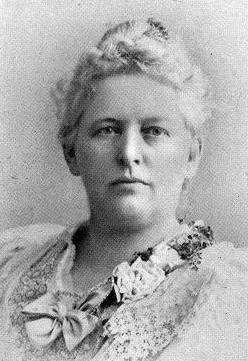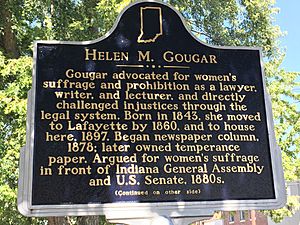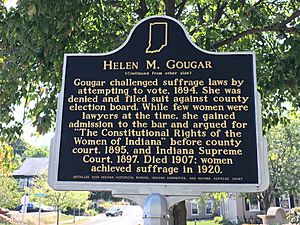Helen M. Gougar facts for kids
Helen M. Gougar (born July 18, 1843 – died June 6, 1907) was an important American woman. She was a lawyer, a journalist, and a strong supporter of women's rights. Helen lived in Lafayette, Indiana.
She made history in 1895 when she became one of the first women lawyers in Tippecanoe County, Indiana. This happened when she took on a special "test" case. Later, in 1897, she was one of the first women to argue a case in front of the Indiana Supreme Court. Helen Gougar became well-known for fighting for her own right to vote in the 1894 elections. She also gave many speeches and helped politicians who believed in women's suffrage (the right for women to vote) and prohibition (stopping the sale of alcohol). She was even the President of the Indiana Woman's Suffrage Association. In 2014, a special marker was put up in Indiana to remember her work for women's voting rights.
Contents
Helen Gougar's Early Life and School
Helen Mar Jackson was born on July 18, 1843, in Hillsdale County, Michigan. She grew up in Litchfield, Michigan. She went to college at Hillsdale College. In 1860, she moved to Lafayette, Indiana, with her brothers and uncles. She started working as a teacher in Lafayette's public schools. By 1863, she became a school principal.
Marriage and Family Life
In 1863, Helen married John Gougar. He was a lawyer in Lafayette. After they married, Helen began to learn about law from her husband. She became his legal helper.
Helen Gougar's Career and Activism
Helen Gougar had a busy career. She worked as a newspaper journalist and a lawyer. She also strongly supported two big movements: temperance and women's suffrage. Temperance was about reducing or stopping the use of alcohol. Women's suffrage was about getting women the right to vote. Helen and her husband were also very active in their community in Lafayette.
Working as a Newspaper Journalist
In the 1870s and 1880s, Helen Gougar wrote for newspapers. She had a weekly column called "Bric-a-Brac" in the Lafayette Courier. In her column, she shared her ideas and speeches about temperance and women's suffrage. She was known for her bold and clear writing style. In 1881, Helen started editing a newspaper called Our Herald. This newspaper focused on temperance and suffrage issues. She later became the owner of Our Herald.
Becoming a Lawyer and Fighting for Women's Vote
Helen Gougar first became known for her work in the temperance movement. After attending a big meeting for women's voting rights in 1881, she returned to Indiana. She started working hard to get a law passed that would let women vote. In February 1881, she spoke to members of the Indiana General Assembly. She asked them to support a bill that would let women vote in national elections. However, this bill did not pass.
Helen also worked to elect politicians who supported women's voting rights and temperance. In 1882, she campaigned for politicians in Indiana who believed in women's suffrage. She had more success helping women get municipal (city) voting rights in other places. In 1884, she went to Kansas to help create a bill for city voting rights. This bill became a state law in Kansas in 1887.
Helen Gougar decided to test Indiana's voting laws herself. She tried to vote in Tippecanoe County, Indiana, in November 1894. The county election board would not let her vote. So, she sued the board. Helen became one of the first women lawyers in Tippecanoe County. She appeared in court as an attorney in January 1895. She argued her "test" case on the same day she was allowed to practice law there. The judge ruled against her, but Helen appealed the case. It then went to the Indiana Supreme Court in Indianapolis.
On February 10, 1897, Helen Gougar made history again. She became one of the first women to argue a case before the Indiana Supreme Court. In the case called Gougar v Timberlake (1897), she spoke for herself. Helen argued that voting was a natural right for both men and women. She said the Fourteenth Amendment to the U.S. Constitution should give her this right. This was true even if Indiana's constitution only allowed men aged twenty-one and older to vote. The Court decided that voting was a political right, not a natural one, and denied her appeal. However, Helen's arguments were printed in Indiana newspapers. This helped spread her ideas about voting rights across the state.
Later Years and Legacy
Helen Gougar stayed active in politics as she got older. The Prohibition Party chose her to run for Indiana attorney general in 1896. She continued to support politicians who shared her views, like William Jennings Bryan. She also gave many public speeches and traveled a lot with her husband.
Helen Gougar died suddenly at her home in Lafayette on June 6, 1907. She was known as a strong leader for the women's suffrage movement in Indiana. Her death happened more than ten years before women finally gained the right to vote across the U.S. with the Nineteenth Amendment.
Honoring Helen Gougar
A special historical marker was put up in Tippecanoe County, Indiana, in November 2014. This marker honors Helen Gougar's important work in helping women get the right to vote.
 | George Robert Carruthers |
 | Patricia Bath |
 | Jan Ernst Matzeliger |
 | Alexander Miles |




